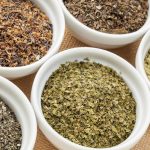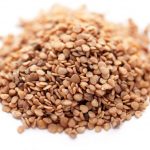
Clover — sources, health benefits, nutrients, uses and constituents at NaturalPedia.com
Thursday, September 28, 2017 by Frances Bloomfield
http://www.naturalnewsherbs.com/2017-09-28-clover-sources-health-benefits-nutrients-uses-and-constituents.html

The clover or Trifolium genus is composed of over 300 perennial and annual plants found in temperate and subtropical regions in nearly all corners of the world, save for Australia and Southeast Asia. Generally, these short-lived herbs bear tiny and fragrant flowers, and small and dry fruits. The most widely cultivated members of this genus are white clovers (Trifolium repens) and red clovers (Trifolium pratense), both of which are extensively used as fodder plants thanks to their palatability and nutritional content. While most often used for animal feed, humans can reap the health-promoting benefits of clovers as well.

List of known nutrients
As a whole, clovers are known to be high in important nutrients like calcium, protein, and phosphorus. White clovers and red clovers, on the other hand, have their own unique plethora of minerals and vitamins.
White clovers are high in protein and contain moderate amounts of magnesium, potassium, and vitamins A, C and E, making them one of the most frequently used additions in livestock feeds. Red clovers, on the other hand, are the ones most prized by herbalists because of their abundance in medicinal constituents such as phenolic glycosides, isoflavones, coumarins, flavonoids, and polysaccharides.
Medicinal uses for clovers
Red clovers are believed to be excellent sources of isoflavones. These substances are phytoestrogens, or water-soluble chemicals that act similarly to estrogen. As such, red clovers are often used as natural remedies to alleviate the symptoms of menopause, such as hot flashes, headaches, and skin problems.
The isoflavones in red clover have been shown to be effective in skin disorders as well, specifically skin eruptions and inflammation. Their impact on estrogen has positive anti-inflammatory and collagen-boosting effects that can prevent skin conditions like eczema, psoriasis, and acne.
Thanks to their expectorant and antispasmodic properties, red and white clovers have also been used to provide relief from such respiratory conditions as inflamed lungs and bronchitis. Moreover, their mild sedative effect can make it easier to get through whooping cough.
Red clovers have been used to treat or prevent several other health conditions, most notably:
- AIDS
- Cancer, including breast cancer
- Infections
- Inflammation
- Influenza
- Mucous congestion
- Tumors
While not as popular as red clovers in terms of medicinal usage, white clovers have their own benefits. Namely, white clover tea infusions have been used in the past to combat fevers and colds, while tinctures made from white clover leaves have been utilized as gout ointment.
Body systems supported by clovers
Red clovers protect the heart through two ways. Firstly, the isoflavone content can decrease low-density lipoprotein (LDL) cholesterol levels while simultaneously boosting high-density lipoprotein (HDL) levels, resulting in lowered risk of arterial blockage. Secondly, the coumarins prevent the blood from thickening and forming blood clots, which in turn ensures that blood can flow with minimal issues.
The diurectic and cholagogue properties of red clovers are good for the liver, as these actions help flush out any impurities from this organ while also cleansing it.
Both white and red clovers are good for the lungs thanks to their anti-inflammatory and expectorant qualities.
Clovers generally contain valuable nutrients that are necessary for the various organs to perform at optimum efficiency and make them less susceptible to damage or disease. Their vitamin C content, meanwhile, can support immune system activity and make these organs even stronger and less prone to wear and tear.
Ways to use clovers
Nearly all aerial parts of clovers can be used in recipes that need a touch of mildness to complete them. However, one of the easiest ways to reap the nutritional advantages of clovers is to steep their dried flowers in boiling water to enjoy as a healthy tea.
Additionally, clovers can be made into a salve for external use.
Where to learn more
- Ease menopausal symptoms naturally with red clover
- Red Clover Blocks Neurological Damage From MSG
- Red Clover Shown to Improve Bone Mineral Density and Lower LDL Cholesterol
- Red clover improves blood flow, bone density and alleviates menopause symptoms
- Study Reveals Benefits of Red Clover for Prostate and Liver Health
Summary
Clovers are nutritious plants with many health benefits, especially red and white clovers. Red clovers can support the heart and liver, as well as lower the risk of skin inflammations and soothe the painful symptoms of menopause. White clovers can help the lungs and make the body less prone to gout, fever, and colds. Moreover, clovers as a whole are good sources of beneficial nutrients that can aid the immune system.
Sources include:
Brittanica.com
FAO.org
TheHerbalAcademy.com
HerbWisdom.com
MorphemeRemedies.com
Tagged Under: Tags: Clover





